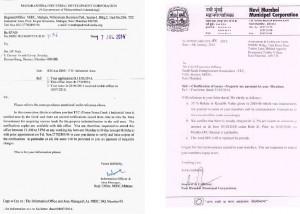MIDC: How industry gets sabotaged, land-grab abetted, and extortion ignored
The Constitution of India has a very interesting section which most people are not very familiar with. It is Article 243 Q (c) which states that municipal corporations should be formed in every urban area of each state except where “the Governor may [decide] that the municipal services being provided or proposed to be provided [is] by an industrial establishment in that area and [he may declare it] by public notification . . .an industrial township.” This clause was retained even when the article got modified on 20 April 1993
The significance of this clause cannot be underestimated. The founding fathers knew that for industrialisation to succeed, notified industrial areas, and townships managed by such industries, should be exempted from the commercial exploits of municipal corporations. This is the constitutional provision which has enabled model industrial townships like Jamshedpur to survive repeated attempts by state governments to exercise political control and earn revenues from such complexes. Thus. Jamshedpur could survive even the worst days in Bihar. In fact, the smart cities concept, including the existing NOIDA near New Delhi, is structured using this constitutional provision.
 It was to protect industrial complexes from the excesses of real estate manipulations that most state governments created Acts relating to industrial clusters. In Maharashtra it is called the MIDC or the Maharashtra Industrial Development Corporation. The land belongs to the MIDC; all industrial units in that notified territory are its lawful lessees (http://www.asiaconverge.com/2016/07/extortion-land-grab-navi-mumbais-midc-part-i/). Thus the lease agreements are between the unit holders and the MIDC and not with local municipal corporations. Development charges are paid by unit holders to MIDC (see pix alongside).
It was to protect industrial complexes from the excesses of real estate manipulations that most state governments created Acts relating to industrial clusters. In Maharashtra it is called the MIDC or the Maharashtra Industrial Development Corporation. The land belongs to the MIDC; all industrial units in that notified territory are its lawful lessees (http://www.asiaconverge.com/2016/07/extortion-land-grab-navi-mumbais-midc-part-i/). Thus the lease agreements are between the unit holders and the MIDC and not with local municipal corporations. Development charges are paid by unit holders to MIDC (see pix alongside).
That is why it is extremely disturbing when the most important industrial cluster – the Trans Thane Creek MIDC or TTC-MIDC – in the most industrialized state in the country, should choose to throw such provisions to the winds. It has allowed a local municipal body, the Navi Mumbai Municipal Corporation (NMMC), to levy charges on MIDC’s industrial units, and to allow NMMC’s officers to bully and even threaten such units.
TTC-MIDC – a notified industrial area — is important because it is home to around 4,000 small and medium enterprises (SMEs). They, in turn, provide over 500,000 direct jobs and another 500,000 indirect jobs and thereby support almost a million families. Collectively, the TTC-MIDC units generate Rs.10,000 crore by way of taxes to the state and central exchequer. It was part of Make-in-Maharashtra, and Make-in-India.
MIDC’s willingness to allow land-grab – apparently in collusion with NMMC – was quite evident in 2013, when the Bombay High Court issued demolition orders for illegal structures (http://www.asiaconverge.com/2016/07/extortion-land-grab-navi-mumbais-midc-part-iii/) and restored the illegally possessed lands to both NMMC and MIDC. All along neither party objected to this land-grab. Much of the land-grab had been effected by people close to the political party in power right since 1991 when the NMMC was formed.
A few years ago, NMMC began issuing property tax demands to industrial units in TTC-MIDC. NMMC had no authority to do so, yet MIDC did not object.
Worse was yet to come. NMMC began sending musclemen to the units that had been targeted, with inflated bills. It wrote to their bankers and froze their bank accounts too (some 900 accounts were reportedly frozen). If the unit holders managed to ‘settle’ matters, the NMMC sent out letters regretting the inflated bills, which was on account of an oversight (see pix). This is nothing short of misusing official position for extortion. But MIDC, which was obliged to insulate the industrial units, did nothing.
Local industrialists claim that ‘settlement’ usually meant that each unit had to consent to handing over revenues or even equity stakes to the political bosses in the region. It must be mentioned, however, that this could not be confirmed. Written communications to NMMC and MIDC seeking replies were ignored or were forwarded to other departments without any answers to the queries raised (http://www.asiaconverge.com/2016/07/extortion-land-grab-navi-mumbais-midc-part-ii/ and URL). MIDC thus remained a silent spectator to NMMC’s bills, the land-grab, and other actions that prima facie appear both illegal and extortionate.
Finally, some local industrialists thought that they should fight back and filed appeals and petitions with the Bombay High Court and even the Supreme Court. It must be mentioned that once cases were filed with the courts, NMMCs musclemen stopped visiting the units which had approached the courts. NMMC and MIDC officials have refused to discuss this and related matters. Some global partners of industrial units have written to the prime minister’s office and have plans of escalating this battle further.
Whatever the eventual verdict of the courts, there are some serious questions that need to be addressed:
- How can any government talk of “Make in India” when it cannot even prevent a local government authority from disdainfully ignoring the notified nature of industrial complexes?
- Do industrialists have to turn to lawyers and to courts each time an inflated bill is sent, or a demand is illegally made? Can the state not provide measures for remedying the situation promptly?
- Why have the officers who have indulged in or abetted land-grab and extortionate demands not been suspended, charge-sheeted, and eventually dismissed? Is money-making more important than industrial development and employment generation?
Clearly, India has a lot more to do if it wants industrialisation to pick up in the country. Investments do not take place when entrepreneurs have to contend with goons masquerading as law-enforcement officers. The government will have to take a firm stand on this and related issues.





































COMMENTS